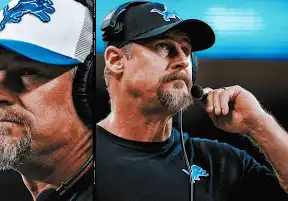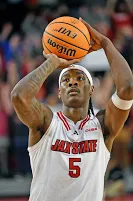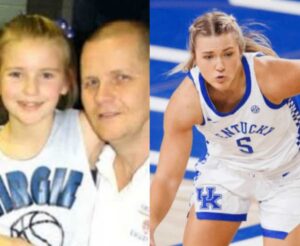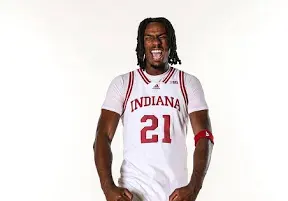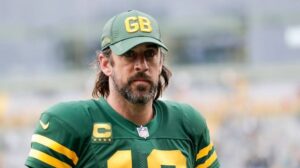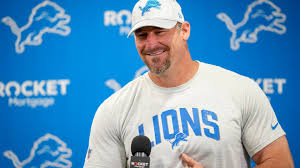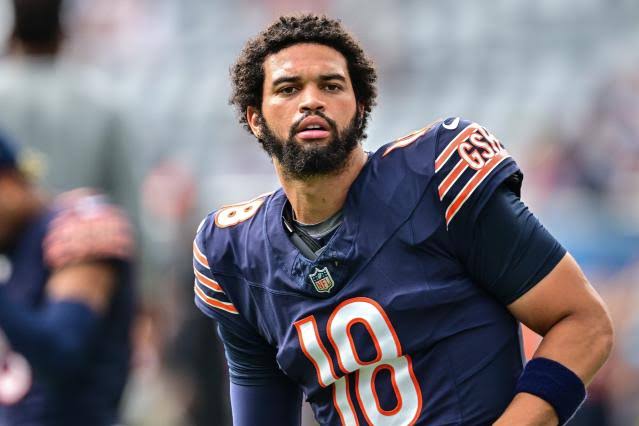
In April, many expected the Chicago Bears offense to be among the NFL’s best.
With the additions of quarterback Caleb Williams and wide receiver Romeo Odunze alongside D.J. Moore and newly acquired Keenan Allen, optimism was high. Tight end Cole Kmet and free-agent signing D’Andre Swift from the Detroit Lions further bolstered their roster.
Now, 12 weeks into the season, it’s clear why games aren’t won on paper. The Bears’ offense, while still dangerous, has fallen short of expectations. Despite Chicago’s middling stats, Detroit’s injury-ridden secondary could be a critical factor.
Additionally, Williams’ mobility adds another challenge, compensating for what may be the NFL’s worst offensive line. To break their Thanksgiving losing streak, the Lions must contain the Bears’ passing game.
Bears’ Offensive Weapons
The Bears boast a variety of targets for Williams. D.J. Moore remains their primary weapon, with 54 catches, 566 yards, and four touchdowns this season. Against Detroit last year, Moore tallied 13 catches for 164 yards and two touchdowns, proving to be a consistent threat.
Rookie Romeo Odunze has had a mixed first year, logging 39 catches for 518 yards and one touchdown. Despite two 100-yard games, he’s been held under 40 yards five times.
Meanwhile, Keenan Allen, brought in from the Los Angeles Chargers, has contributed 39 catches for 368 yards and three touchdowns. Historically, Allen has been a problem for Detroit, recording 34 catches for 439 yards and two touchdowns in three games against them.
Cole Kmet, another key piece, has notched 39 catches for 422 yards and three touchdowns this season. Kmet’s career numbers against Detroit—28 catches, 295 yards, and four touchdowns in eight games—show his growth into a dependable and often underestimated threat in the passing game.
Lions’ Secondary Challenges
Detroit’s secondary is dealing with injuries. Rookie cornerback Terrion Arnold, who missed Week 12 with a groin issue, appears ready to return after limited practice. His Week 12 replacement, Kindle Vildor, struggled against the Colts, giving up three catches for 60 yards on six targets and earning a 28.0 PFF grade.
Carlton Davis III left last week’s game with a knee injury and is unlikely to play, leaving the Lions to rely on backups like Khalil Dorsey.
Emmanuel Moseley, who played 15 snaps on special teams in his 2024 debut, might see increased defensive responsibilities if coaches believe he outperforms Vildor. With Alex Anzalone on IR, linebackers Jack Campbell and Malcolm Rodriguez must excel in coverage against Kmet.
Containing Caleb Williams
Detroit’s defensive line must exploit Chicago’s struggling offensive line, which has allowed 44 sacks and 298 sack yards—the second most in the league. Williams faces pressure on 22% of dropbacks, according to Pro Football Reference. The Lions must capitalize on this weakness.
However, Williams thrives outside the pocket, often scrambling to extend plays, a skill he showcased at USC. While his NFL success with this strategy has been inconsistent, it remains a threat.
Detroit recently struggled against Colts quarterback Anthony Richardson, who rushed for 61 yards on 10 carries. Although Richardson didn’t score, his mobility disrupted the Lions’ defense.
Williams has 55 carries for 339 yards, averaging six yards per carry and just under 31 yards per game. To limit Chicago’s passing game, Detroit must pressure Williams while containing him in the pocket to prevent big plays. If successful, the Bears’ aerial attack will be neutralized.
